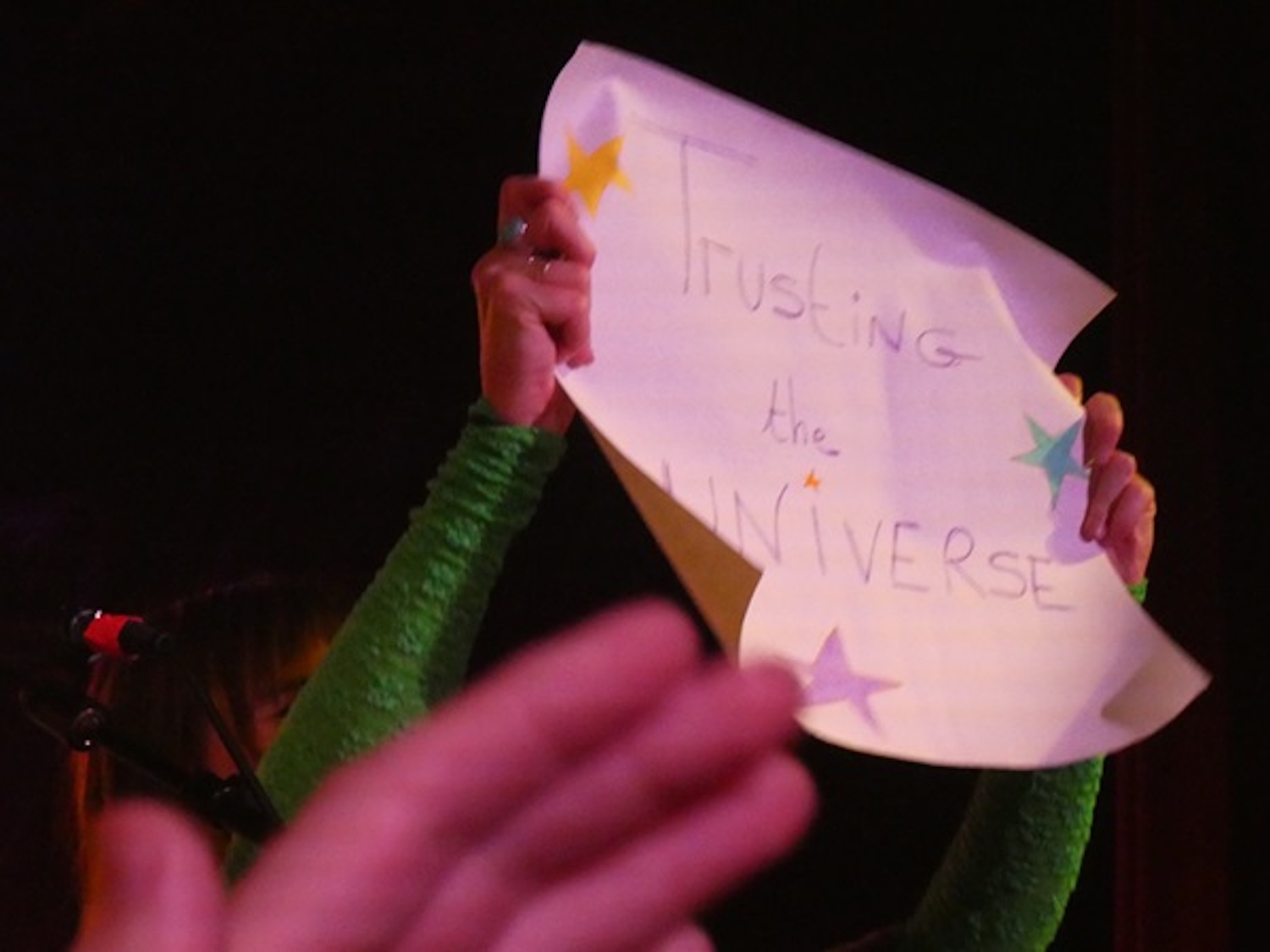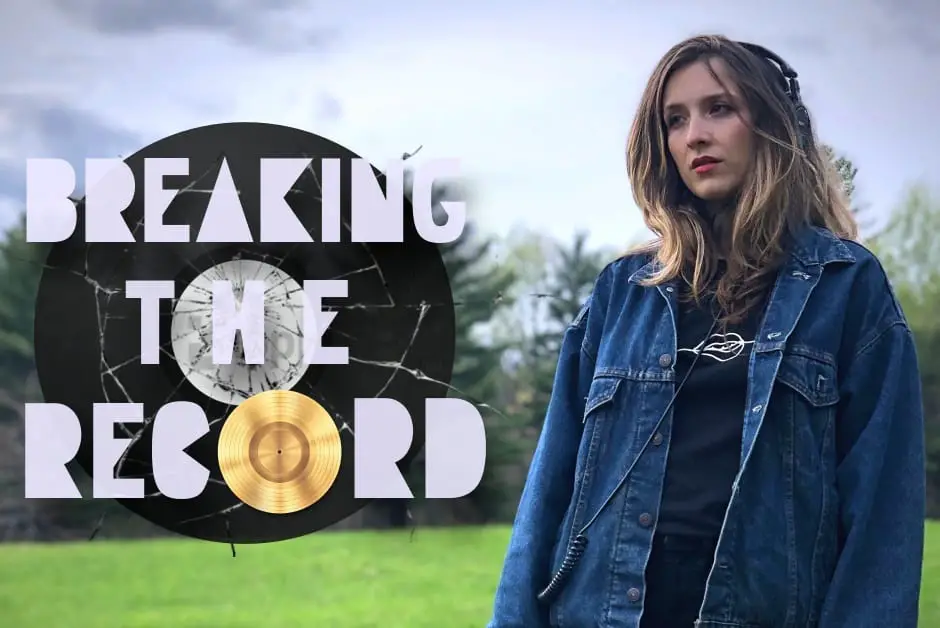Singer/songwriter Angie McMahon’s sensibilities speak to the first steps of healing, if not a commitment to honesty. She created a therapeutic experience for all in attendance of her concert at Portland’s Star Theater, bringing the songs off her sophomore album ‘Light, Dark, Light Again’ to life with care and cathartic passion.
Stream: “Serotonin” – Angie McMahon
When Stephen Thompson of NPR touts a musician as a “one-woman reincarnation of Fleetwood Mac,” that’s a helluva expectation to meet.
She could sell out the Star Theater in downtown Portland all she wants; such hyperbole will still breed skepticism in regards to an artist’s talents.
It’s patently reckless to suggest any artist has the combined voice of Stevie Nicks, the McVies, Lindsey Buckingham, and Mick Fleetwood. Such a lofty goal would have sunk Melbourne’s Angie McMahon had she ever approached a guitar with so much a notion.
Nevertheless, the juxtaposition does make sense. McMahon’s register takes on a graver complexion of Christine McVie’s high and clear contralto. McMahon’s register stays lower to the ground, somber and warbling and wet with emotion. She stays dormant before erupting in the chorus with brilliant flashes of piano and guitar. It’s an immaculate use of quit-loud, big indie sound characteristic to the independent rock sphere.
The sound is not quite so cliché as the level of the “clap-clap-stomp-hey” folk craze of the mid-aughts (although she does playfully reference that method in “Serotonin”), but it is certainly an aesthetic choice that garners fans by encouraging them to make like Cat Stevens and sing out.
It’s okay, it’s okay
Make mistakes, make mistakes
It’s okay, it’s okay
Make mistakes, make mistakes
– “Letting Go,” Angie McMahon
This is McMahon’s greatest strength, and probably why Thompson reads so confident in his comparison.1
It’s why people need music, why they want concerts; it’s not because they seek just experience or connection – what they seek is their truth. A truth they can recognize in the eyes, voice and song of an artist whose experience relate as to touch upon Godhead.
Her music, plainly stated, is not a substitute for therapy. But that shock of recognition embedded within the lyrics is in itself therapeutic. She’s not a call from your therapist. She’s a call to see your therapist. She’s a call from a best friend for the first time in months because the relationship doesn’t require a constant check-in.2
McMahon does this outside of the music, as well. She went beyond explaining the meaning of each piece to encourage the audience to take a deep breath, give space to each other and reflect on the history of the land they stand upon. This is the second strength of her music, a message of awareness and consideration.

Whether bodily, social, historical, McMahon’s sensibilities speak to the first steps of healing, if not a commitment to honesty.
Both her lyrics and her vamping fit quite tidily into what has become a larger societal movement toward therapy and psychological work.
More pertinently, it’s endearing to watch her fans recite every word of every song on the setlist without fail. Forget Fleetwood Mac, this is a level of dedication akin to Taylor Swift. Me being only a recent adherent, I could only sing a select few verses from “Divine Fault Line,” “Serotonin,” “Letting Go,” and the ever-stalwart “Pasta.”
I’ve been lost, I’ve been lost
I’ve been lost, I’ve been lost for a while
But I’m really trying
– “Pasta,” Angie McMahon
McMahon first appeared on my personal radar in late-2022, as a featured voice on Actual Life by Fred again..; the British electronic artist sampled the chorus of “Pasta” off her debut, Salt, for “Angie (i’ve been lost),” the emotional centerpiece of his album. Set within the amber of breakbeat snare drums, vibrato synthesizers and pulsing vocal textures, the sample exalts the DJ’s opinion of her as “one of [his] favorite singers ever.”
Following the trail of samples, I found the original but didn’t think much of it. Perhaps due to a song-structure that takes a while to engage the strengths of its chorus, more likely because I was struggling with my sense of self as a music journalist. Regardless, her name was stuff in a part of the brain with a sticky note reading “For Later.” Then the sticky note fell off.3
That is not the case for Light, Dark, Light Again, which, even though it released during a dark period, has been labeled “for right the hell now.”
The album takes its name from the cyclical spiral of its ultimate track, “Making It Through.” But for the preceding eleven songs, McMahon wrings out every ounce of depression and self-loathing and loneliness endemic to Salt.
It’s an album for the small hours of the morning. An album that peaks with the moon and the street lights and the writer frantically typing their next blog post because they can’t sleep if it’s never finished only to be stopped in their tracks by a single song that so perfectly describes the last twelve months of their life.4
I will run to lift the levels
I will dance at the same time as breakfast
I will schedule my friends in
And I’ll eat more Tryptophan, oh
I will work on moving through it
And how I communicate it
– “Serotonin,” Angie McMahon
If the songs are slow, it’s only because she is taking care to notice every crease and wrinkle of wisdom in the reflection.
If her vocals are wet, it’s only because she found those last remaining tears to cherish like mistakes. If she’s cracking a smile in song, it’s because she’s letting them go.
Three moments stand out from the concert that exemplify all of this prose.
The first came during the vamping period after “Mother Nature,”5 when McMahon began to explain her next song as one that came from rock bottom. Not such a bad place to be, she explained, as the twinkle of epiphany came across the eyes of every fan in the front row. From there, she launched into “Divine Fault Line.”6
While the pre-chorus stumped even the most prepared fanatics, that didn’t stop them from trying, making mistakes along the way before erupting in choral catharsis.
“You’re on your own dark side of the border tonight/
And you’re all f***ed up and you’re wanting to die/
And that’s the place where the breaking out begins/
It’s the divine fault line opening.”
– “Divine Fault Line,” Angie McMahon
The first row carried the words through the crowd, through the theater. Did they carry it to the corner of Sixth and Burnside? I can’t say. But they were clearly singing from months of preparation for McMahon’s tour, culminating in one chorus, two chorus’ and then three, louder with each go of it.
The second moment came with McMahon following through on a notion that came to her in the morning. The crowd was on the edge of her every word as she explained her aversion to drum machines in favor of the real thing before checking that the beat machine was ready. Concerns of a low-battery came from the rhythm section, but, being so close to the moment, they charged ahead.
Their instrument of choice? A Nintendo DS.
The central beat thumped with the air of a dance club. The twinkling eye of epiphany came across the crowd again and I scribbled on my notepad, please be the song I think it is.
“Hey, I got real low on serotonin.”
“Yessss,” I bleated out. This was it. This was the song that did it.
The song that peaks with the moon and the streetlights and me, frantically typing my next blog post because I couldn’t sleep if it’s never finished. The song that pushed me at 1 AM to send the email to see this artist who so perfectly described my life for the last twelve months. The song that convinced me to schedule my friend Koa in and let him know that this is what I live for.7
And now she was playing it. Whether on whim or cosmic coincidence or divine fate, she was playing it. For her, for me, for everyone, she was playing it, crushing it, living it on the edge of a dying Nintendo DS battery. I guarantee you, that was probably the most alive a handheld video game console has ever felt.
The third moment came at the end of the concert, when a fan-made sign was handed through the crowd to the stage. It read “Trusting In The Universe.” I tried to grab a photo but, being a row behind the front, I couldn’t help but capture a pair of hands applauding at the bottom of the frame. On first reaction, this error infuriated me. But as I keep looking at it, all I can do is tell myself it’s okay.
Make mistakes.

——————————————————————————–
1 The Nicks-McVie-Buckingham era of Fleetwood Mac constitutes the ultimate classic rock group among women, trail blazing on the songwriting power of Nicks and McVie, with just enough guitar machismo provided by Buckingham to appeal to men. Looking around the crowd drawn by McMahon, the appeal to women is first thing a person notices. But that does not mean the men will not find something in her music, either.
2 Then again, this describes my relationship with most of the artists I loved dearly as a teenager. If McMahon reached that level, then bully for her.
3 On review, McMahon’s as much as I enjoy the chorus of “Pasta,” the song lacked a certain immediacy and accessibility in comparison to “Slow Mover,” “Keeping Time” or the blues-driven “Missing Me.” Nor does it have quite the same blueswoman pathos of “Standout,” which pushes back against Rory Gallagher guitar fantasies and Allmanite tales with a soft blues musicality and lyrical counterpoint to the wants of a “Ramblin’ Man.” The truth is, her debut was a fine but messy album, and it largely stayed within a morose state to diminishing returns.
4 Continuing the review, if Salt was an album of tunnel songs, then Light, Dark, Light Again is a collection for crossing the bridge. Under the open sky, she’s singing to stars again. She alternatively opines, laud, extol and encourages her audience that depression, like darkness, no longer defines their horizon; that old medicines, like clothes, no longer fit them; that wasting time, like making mistakes, is a skill to be learned.
5 All things considered, probably the weakest cut off the album despite its agreeable environmental message. If one had to cap the album at 12 tracks, “Mother Nature” would be an easy decision to make on the cutting floor.
6 All things considered, probably the strongest cut off the album. “Letting Go” works as the lead single, but “Divine Fault Line” has the strongest chorus, with a whispering Enyaesque quality that charms and sparkles with the piano. Speaking of the piano, the chord progression is subtle but strong and bell-like. Then it shows the other half in the bridge with idiophonic splendor.
7 Koa, for his part, found his slow jam in “Fireball Whiskey.” which McMahon used as an opener to really set the mood of “you might cry tonight, I know I will.” Did I cry? No, I’m just not that kind of guy in public. But I am a hugger and his presence at the concert did merit a big ol’ hug afterwards as we walked back to his car.
— —
:: stream/purchase Light, Dark, Light, Again here ::
:: connect with Angie McMahon here ::
— — — —

Connect to Angie McMahon on
Facebook, Twitter, TikTok, Instagram
Discover new music on Atwood Magazine
© Ben Niesen
:: Stream Angie McMahon ::


 © Ben Niesen
© Ben Niesen





